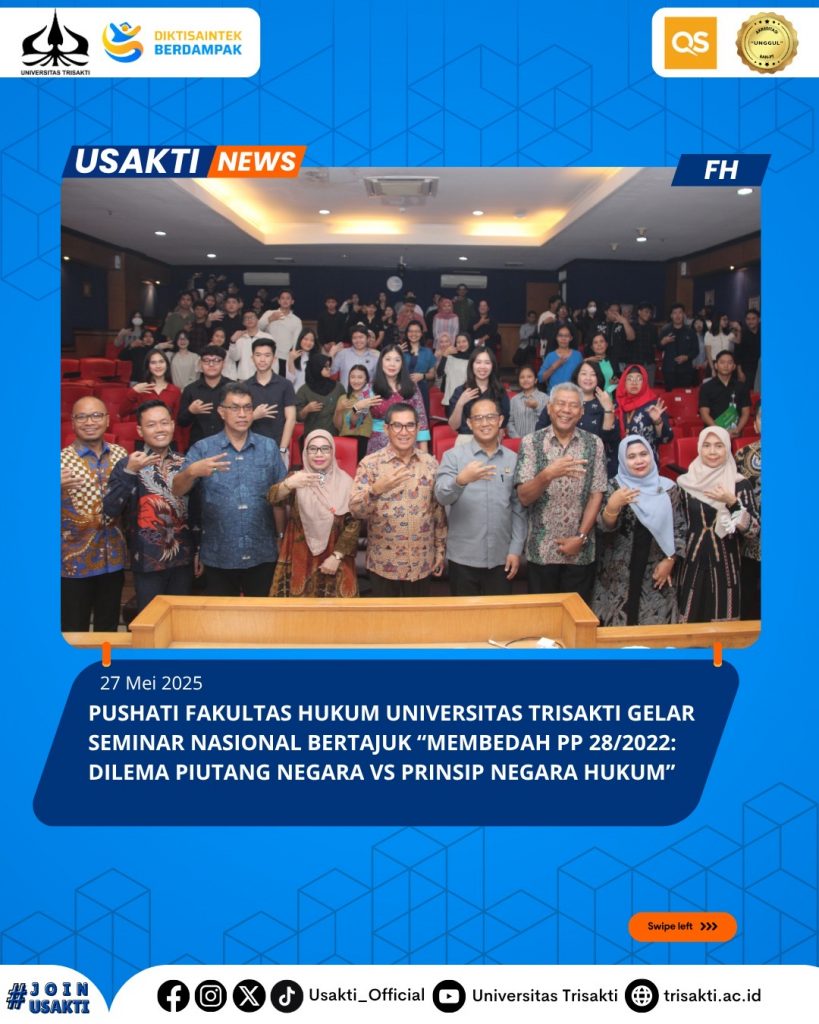Contact Us
- JL. Kyai Tapa No. 1 Grogol
- Jakarta Barat, Indonesia
- Phone:
- (62-21) 566 3232
- Whatsapp:
- (+62) 882 194 856 74
- (+62) 877 707 077 03
- Fax: (62-21) 564 4270
- Email: humas@trisakti.ac.id

Jakarta, Tuesday, May 27, 2025 — The Center for Constitutional Law Studies (Pushati) of the Faculty of Law at Universitas Trisakti held a national seminar entitled “Examining Government Regulation No. 28/2022: The Dilemma Between State Receivables and the Rule of Law.” The seminar took place at the Prof. E. Suherman Auditorium, Building H, Faculty of Law, Universitas Trisakti, and featured several distinguished speakers, including Dr. Widodo, S.H., M.H. (Director General of General Legal Administration, Ministry of Law and Human Rights of the Republic of Indonesia), Dr. Hamdan Zoelva, S.H., M.H. (Chief Justice of the Constitutional Court 2013–2015), Prof. Dr. Wicipto Setiadi, S.H., M.H. (Professor of Law at UPN Veteran Jakarta), and Dr. W. Riawan Tjandra, S.H., M.H. (Expert in State Finance Law from Atma Jaya University Yogyakarta). The event was officially opened by the Dean of the Faculty of Law, Universitas Trisakti, Prof. Dr. Dra. Siti Nurbaiti, S.H., M.Hum.
In his opening remarks, Ali Rido, Head of Pushati FH Usakti, emphasized that Pushati, as a research institution dedicated to constitutional law, remains committed to contributing thought and ideas through research, studies, seminars, and discussions related to constitutional issues in the Republic of Indonesia. He stated that the issue raised in this seminar is a crucial one that has received insufficient public attention. The handling of state receivables has long been a challenge for the government with no definitive resolution. Government policies—such as the issuance of Government Regulation (PP) No. 28/2022 concerning the State Receivables Affairs Committee—risk violating the principles of the rule of law as mandated by the 1945 Constitution of the Republic of Indonesia. “The state must not act arbitrarily in enacting policies that may be counterproductive to constitutional principles and order,” he asserted. Through this national seminar, it is hoped that ideas for the revision and refinement of PP No. 28/2022 will emerge.
Dr. Widodo, S.H., M.H. explained that the primary aim of PP No. 28/2022 is to strengthen the tasks and authority of the State Receivables Affairs Committee (PUPN), with the expectation of enhancing effectiveness and efficiency in the collection and resolution of state receivables. However, Dr. Hamdan Zoelva, S.H., M.H. raised concerns that the regulation overlaps with higher legal norms. He noted, “As a delegated regulation or implementing regulation, a PP must not contradict higher norms, including the parent law that delegates its authority—specifically Law No. 49 PRP of 1960.” For instance, the expanded definition of debtors in PP No. 28/2022 is in conflict with multiple statutory norms and universally recognized legal principles. Additionally, provisions related to coercive measures, civil actions, and public services should not be governed at the regulation level, as the Constitution clearly states that any limitation of human rights must be stipulated at the legislative (law) level.
Prof. Dr. Wicipto Setiadi, S.H., M.H., a legislative expert, pointed out that several provisions within PP No. 28/2022 present potential disharmony and conflicts. First, in relation to Law No. 1/2004 on State Treasury, if there are no clear administrative limits or controls, there is a risk of excessive authority being delegated to PUPN. Second, regarding Law No. 30/2014 on Government Administration, the absence of a transparent objection and oversight mechanism may conflict with the principle of due process. Third, in terms of citizens’ constitutional rights, the authority granted to PUPN to seize and auction assets could potentially infringe upon property rights if not carried out according to fair legal procedures.
Finally, Dr. W. Riawan Tjandra, S.H., M.H. highlighted several legal challenges in handling state receivables, including the extent to which implementing regulations can define new legal content. He questioned whether such content should be limited only to what is explicitly mandated by the enabling legislation, and how technical implementation should be addressed in derivative regulations. These unresolved issues, he argued, remain problematic within PP No. 28/2022.
Source: Head of the Center for Constitutional Law Studies, Faculty of Law, Universitas Trisakti